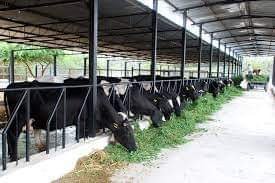http:// by-DR. RAJESH KUMAR SINGH, (LIVESTOCK & POULTRY CONSULTANT) 9431309542, rajeshsinghvet@gmail.com
by-DR. RAJESH KUMAR SINGH, (LIVESTOCK & POULTRY CONSULTANT) 9431309542, rajeshsinghvet@gmail.com
Heat stress in dairy cattle is a common problem in many areas of the world at least in some months of the year. The main consequences of heat stress are a reduction in dry matter intake, milk production and reproductive performance . High temperatures may activate the hipothalamic-suprarrenal axis resulting in compensatory mechanisms to help maintain normal body temperature . This often results in the loss of some electrolytes and bicarbonate. It has been suggested that cows under heat stress may find a benefit of being supplemented with additional sodium bicarbonate, resulting in improved productive performance.High nutrients demand of dairy animals in early lactation can usually be fulfilled by high concentrate diet , which generally results in low acetate to propionate ratio . This leads to decreased feed consumption because of ruminal acidosis and thus low milk yield and milk fat content. Decreased feed consumption not only reduces milk yield but it also impairs reproductive performance through delayed onset of ovarian cycle . Delayed resumption of ovarian activity has been attributed to low insulin like growth factor due to decreased dry matter intake . Moreover, low IGF-1 also reduces the ability of follicles to produce sufficient estradiol by stimulating granulosa cells for estradiol production and thus reduces the chances of successful ovulation. There may be many ways and means to enhance the feed intake in early lactation. One of the most promising is supplementing of sodium bicarbonate (SB). Low cost and abundant availability of SB for the farmers of tropical region offer a potential nutritional economical tool to increase dairy animal productivity as SB increases DMI by counteracting ruminal and systemic acidosis. Sufficient scientific evidence is available regarding favourable effects of SB supplementation in dairy cows. Moreover, physiological status, environmental condition and feeding strategies of buffaloes vary from that of exotic dairy cows in temperate region and SB responses of exotic dairy cow may not be of worth for direct application on buffaloes.Feed Additives for Heat Stress ———In addition to formulating diets for adequate nutrient intake by the cow, a number of “non-nutritive” additives are available which have potential to improve performance during hot weather.Sodium bicarbonate is a frequently used feed additive that is especially useful during hot weather. Because high concentrate, low forage rations are often fed to encourage DMI during hot weather, or because cows selectively reduce fiber intake in response to high temperatures, the potential for acidosis due to inadequate dietary fiber content is real. Buffers minimize pH fluctuations, usually enhance fiber digestion, and often encourage greater DMI.Huber et al. (1994) reviewed the use of fungal cultures added to diets during heat stress conditions. The species for which the heat stress data were available were of strains of Aspergillus oryzae (AO). In several of the studies summarized, rectal temperatures were lower in AO supplemented cows although there was no change in some studies. A number of studies also reported greater milk yield with AO use during heat stress. Ruminal effects associated with AO use include increased fiber digestion, greater numbers of cellulolytic bacteria, increased turnover rate of lactic acid, and less diurnal variation in rumen pH, ammonia, and VFA . Improved ruminal efficiency and reduced heat production could contribute to greater performance and reduced heat production. Any product which improves ruminal efficiency should contribute to improved performance during hot weather.

